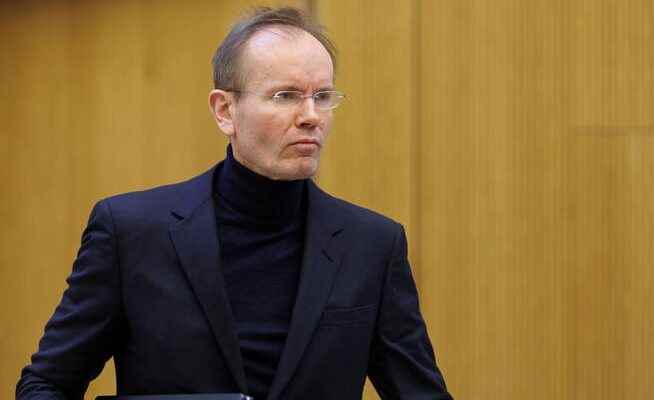The defense of Markus Braun, the ex-boss of Wirecard, applied for the stay of the proceedings on the second day of the trial. He also attacked star witness Oliver Bellenhaus head-on.
Former Wirecard CEO Markus Braun enters the courtroom on the second day of the trial.
Monday, the second day of the Wirecard trial, is Alfred Dierlamm’s day. He is the prominent main defender of Markus Braun, the former head of the payment service provider Wirecard, which collapsed in 2020. Right at the beginning of his so-called declaration of receipt, the defense attorney announces that he wants to combine the declaration with an application for the stay of the proceedings. And he brings out the heavy artillery: “The most serious investigative errors” were made.
Attack on Bellenhaus
Dierlamm justifies the application for suspension by saying that the procedure is “suffering from a serious birth defect”: The basic hypothesis that the so-called third-party partner business (TPA business) did not exist and that “zero sales” were achieved with it, proved to be turned out wrong. According to the defense, the key witness and co-defendant Oliver Bellenhaus, who was the head of a Wirecard subsidiary in Dubai, lured the investigation down the wrong track and the public prosecutor decided too early on his narrative. Nothing was questioned.
The statements made by Bellenhaus to the public prosecutor’s office are not credible and implausible, explains Dierlamm. This was not a key witness and was never one, but the main perpetrator of a gang whose goal was to smuggle money out of Wirecard through shadow structures. The defender refers to domestic accounts of third-party partners through which there were extensive cash flows. However, most of these did not end up with Wirecard or in the trust accounts provided for this purpose, but with shadow companies or embezzlement companies. Some of these were controlled by Bellenhaus.
…and on prosecutors
Only after the indictment in March did the public prosecutor’s office begin to investigate these payment flows. These investigations are so far incomplete. At the same time, since November 7, the defense has been “flooded” in several steps with extensive new data and documents.
However, a main hearing is not suitable for making up for deficits in the investigation. With these justifications, Dierlamm asked the court to “end the massive imbalance, suspend the main hearing and return the proceedings to the public prosecutor’s office”.
Immediately after Dierlamm’s presentation, Markus Födisch, the presiding judge at the Munich District Court, interrupted the session for the lunch break. It was considered unlikely that the court would decide on the application for a stay of proceedings on Monday. Instead, the initial statement by Florian Eder, Bellenhaus’s main defender, began in the afternoon. This will be followed, if there is time, by Sabine Stetter, who represents the third accused, former Wirecard chief accountant Stephan Freiherr von Erffa.
The counter-thesis
The third-party business mentioned by Dierlamm is at the center of the whole process. It stands for transactions with so-called third-party acquirers (TPA). Payment services were outsourced to third parties and Wirecard only acted as an intermediary. This is said to have happened primarily where Wirecard did not have the necessary licenses. Alleged main TPA partners were three companies in Dubai, in the Philippines and in Singapore.
The core thesis of the public prosecutor’s office is that this TPA business never existed in the examined period from 2015 onwards. According to this reading, the profits and credits from it were simply invented. The aim was to present the company as more financially strong and attractive to customers, investors and lenders. In the opinion of the public prosecutor, this was primarily intended to hide the fact that Wirecard’s actual, real business was in deficit.
The public prosecutor considers Braun to be the head of a gang that devised and implemented this construct of lies. She accuses the three suspects of falsifying balance sheets, manipulating the market and cheating around 3.1 billion euros from banks and lenders with false information or of having provided assistance, which she regards as commercial gang fraud. Braun is also accused of infidelity.
“Unprecedented prejudice”
Dierlamm also complained on Monday that his client had been prejudiced. Since the summer of 2020, Braun has been portrayed as a white-collar criminal, the biggest crook or the “gang boss or dumbest CEO of all time”. Such a prejudice is “just as unprecedented as it is formative for the process”.
You can contact the Berlin business correspondent René Höltschi Twitter follow.
